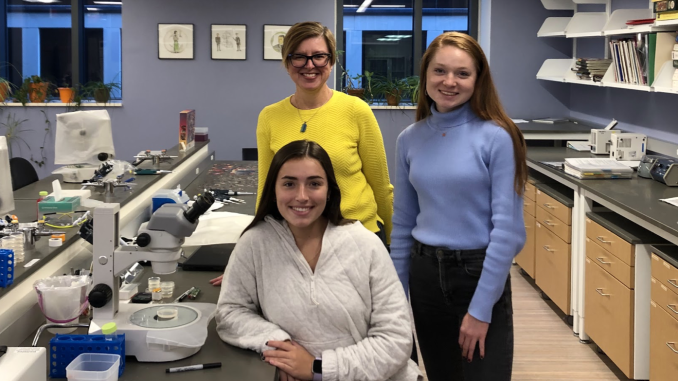
Allia Proctor (alproctor@ursinus.edu)
Dr. Rebecca Lyczak is a well-known face in the Ursinus community and beyond. She is a professor of biology, and is conducting groundbreaking research at Ursinus. She is working with model organism C. Elegans to determine the function of the PAM-1 gene. The main objective of her laboratory is to understand what proteins work together to regulate fertility and cell division during development. Lyczak earned her B.S in Biology and Education from The College of New Jersey, and later got her PhD. in Cell and Developmental Biology from Weill Cornell Medical College. She also did postdoctoral work at the University of Oregon, and now teaches multiple courses including Genetics, Human Molecular Genetics, Developmental Biology, and the Common Intellectual Experience. She runs a highly successful research lab, which provides many opportunities for undergraduate students here on campus. She also assists in the Students for Inclusive Excellence (SIE) and Science Scholars programs here. These two programs provide both scholarships and mentors to students pursuing degrees in the department. Programs like this also give students the opportunity to participate in J-Bridge, which is a week-long program over winter break helping students bridge the gap between the BIO-101 and BIO-102 courses. When not in the lab or the classroom, she can be found taking a stroll with her golden retriever on and around the Ursinus campus.
Lyczak recalls her passion for science beginning as early as middle school when her parents allowed her to attend space camp, and her first interest of pursuing a career in the science field began when she wanted to be an astronaut. “As an undergraduate, it was a professor who encouraged me to consider graduate school,” and that is exactly what she did. While women are becoming more prominent in the STEM fields, the obstacle of stereotypes and misogyny still remain. Lyczak says that having a support system allowed her to call out misogyny whenever she encountered it and persevere in the face of it. She hopes to be a mentor to young students, in a way similar to how her professors and colleagues were mentors to her.
Her research team consists of 10 students: Kristy Hryniszak ‘23, Ilyssa Marsh ‘24, Brooke Adams ‘24, Sarah Bell ‘24, Ian Rogers ‘25, Alexa Alessandria ‘24, Madison Smith ‘25, Madison Benfield ‘25, Madison Neiman ‘25, and Zara Tabackin ‘23. She uses a combination of genetic approaches with time-lapsed images of early cell divisions to identify the roles different genes have on human development. Lyczak has had much success with her lab, as she characterized the PAM-1 gene in model organism C. Elegans. This gene controls many biological processes in the organism, and can even be related to human functions as well, because the gene is also found in human chromosomes. In other words, Dr. Lyczak is trying to understand how proteins work with this gene to regulate fertility and cell division during development in different species. By being able to identify it in her model organism, she has opened the door for future research in human cases.
She labels the discovery of PAM-1 as her greatest achievement, and recently received a renewal of her grant from the National Institute of Health (NIH). She also received grants from the National Science Foundation (NSF), and getting a grant renewed by the NIH is not an easy task. “Every new submitted grant application must be evaluated on its merits and a profesor can lose funding at any time. When a grant is renewed it is incredibly validating that the work I am doing as both a scientist and a mentor to undergraduates is valued,” she explained. The money from her most recent NIH grant will cover the costs of her research for the next three years. Additionally, some of the money will be put towards funding two summer research students and one future researcher. It will also provide her and her team travel opportunities so that they are able to present their findings at various conferences. However, Lyczak remains humble and believes their work isn’t done just yet, hoping to identify new proteins that interact with PAM-1.
Lyczak’s advice to young students is to be open to trying new experiences and different types of research. By trying various different things, they may stumble upon something that clicks. And as the saying goes, if you never try, you’ll never know. Furthermore, she warns that you may encounter many setbacks, but advises to not let them define you. Whether it is a difficult class, unsupportive mentor, or experiments that fail, try to focus your energy on the good, the successes. The ability to bounce back after a fall is imperative, not only in the STEM field, but in any profession.
